
The Men's Rugby World Cup is a rugby union tournament contested every four years between the top international teams, the winners of which are recognised as the World champions of the sport.

The 1999 Rugby World Cup, was the fourth Rugby World Cup, the quadrennial international rugby union championship, the first World Cup to be held in the sport's professional era.
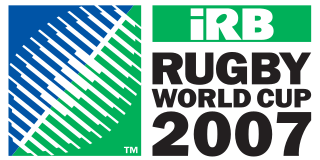
The 2007 Rugby World Cup was the sixth Rugby World Cup, a quadrennial international rugby union competition organised by the International Rugby Board. Twenty nations competed for the Webb Ellis Cup in the tournament, which was hosted by France from 7 September to 20 October. France won the hosting rights in 2003, beating a bid from England. The competition consisted of 48 matches over 44 days; 42 matches were played in 10 cities throughout France, as well as four in Cardiff, Wales, and two in Edinburgh, Scotland.
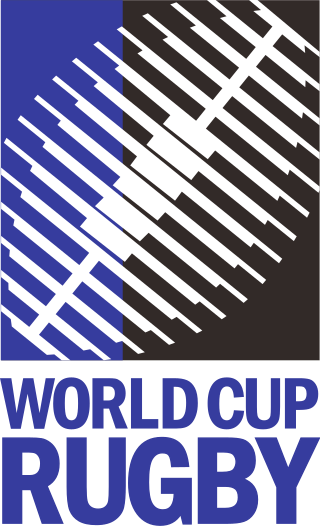
The 1987 Rugby World Cup was the first Rugby World Cup. It was co-hosted by New Zealand and Australia – New Zealand hosted 21 matches while Australia hosted 11 matches. The tournament was won by New Zealand, who were the strong favourites and won all their matches comfortably. New Zealand defeated France 29–9 in the final at Eden Park in Auckland. The New Zealand team was captained by David Kirk and included such rugby greats as Sean Fitzpatrick, John Kirwan, Grant Fox and Michael Jones. Wales finished third, and Australia fourth, after conceding crucial tries in the dying seconds of both their semi-final against France and the third-place play-off against Wales.

The 1995 Rugby World Cup, was the third Rugby World Cup. It was hosted and won by South Africa, and was the first Rugby World Cup in which every match was held in one country.
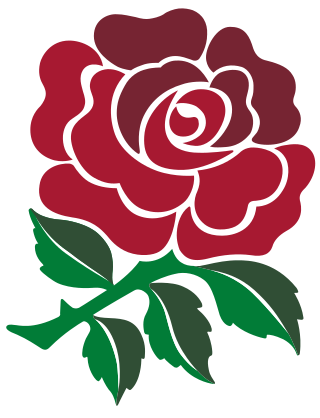
The England men's national rugby union team represents the Rugby Football Union in men's international rugby union. They compete in the annual Six Nations Championship with France, Ireland, Italy, Scotland and Wales. England have won the championship on 29 occasions, winning the Grand Slam 14 times and the Triple Crown 26 times, making them the most successful outright winners in the tournament's history. They are currently the only team from the Northern Hemisphere to win the Rugby World Cup, having won the tournament in 2003, and have been runners-up on three further occasions.

The 1991 Rugby World Cup was the second edition of the Rugby World Cup, and was jointly hosted by England, Scotland, Wales, Ireland and France: at the time, the five European countries who participated in the Five Nations Championship. This was the first Rugby World Cup to be staged in the northern hemisphere, with England the hosts of the final. Also for the first time, qualifying competitions were introduced as the number of entrants had increased, from 16 nations four years earlier, to 33 countries. The eight quarter-finalists from 1987 qualified automatically with the remaining eight spots contested through qualifiers by 25 countries. This resulted in only one new side qualifying for the tournament, Western Samoa replacing Tonga. The same 16-team pool/knock-out format was used with just minor changes to the points system. South Africa was again not included because of sanctions imposed on the country by the International Rugby Board (IRB), due to the government's apartheid policies.

The Canada men's national rugby union team represents the Canada in men's international rugby union competitions. They are overseen by Rugby Canada the governing body of rugby union in Canada.
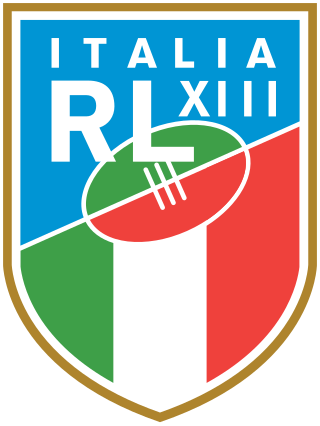
The Italy national rugby league team represents Italy in rugby league football. With origins dating back to the 1950s and 1960s, the team has competed regularly in international competitions since 2008, when their current governing body, the Federazione Italiana Rugby League, was formed. They are currently ranked 13th in the IRL World Rankings.

The 2019 Rugby World Cup was the ninth edition of the Rugby World Cup, the quadrennial world championship for men's rugby union teams. It was hosted in Japan from 20 September to 2 November in 12 venues all across the country. The opening match was played at Ajinomoto Stadium in Chōfu, Tokyo, with the final match being held at International Stadium Yokohama in Yokohama. This was the first time that the tournament had taken place in Asia and outside the traditional Tier 1 rugby nations.
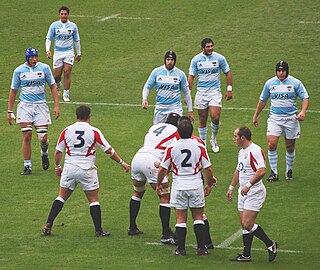
Argentina have competed in all the Rugby World Cup tournaments, starting with the inaugural 1987 tournament.

The Rugby World Cup is a rugby union tournament held every four years and contested by the men's national teams of the member unions of World Rugby. The Wales national rugby union team has participated in all ten Rugby World Cup tournaments. Up to and including 2015, hosting of the tournament alternated between traditional rugby heartlands in the southern hemisphere and those in Europe. Wales was the primary host in 1999, with Cardiff's Millennium Stadium built to coincide with the event, and the other three tournaments played in Europe have also used venues in Wales to some degree. Cardiff's Millennium Stadium and its predecessor, the Cardiff Arms Park, will have hosted a total 21 matches over a total of four World Cups. This is the largest number of World Cup games hosted by one venue.

The Ireland national rugby union team have played in all ten Rugby World Cup tournaments. They have reached the quarter-finals at all but two tournaments, but have yet to progress to the semi-finals. They have finished top of their pool on three occasions.
Pool C of the 2015 Rugby World Cup began on 19 September and was completed on 11 October 2015. The pool was composed of New Zealand, Argentina and Tonga – who all qualified automatically for the tournament due to finishing in the top three positions in their pools in 2011 – along with the top European qualifier, Georgia, and the top African qualifier, Namibia.
The qualification process for the 2023 Rugby World Cup in France began during the pool stages of the 2019 tournament in Japan, at which the top three teams from each of the four pools qualified automatically for the 2023 event. A further eight teams qualified through regional, cross-regional play-offs and the repechage process.
Pool B of the 2023 Rugby World Cup began on 9 September 2023 and concluded on 8 October 2023. The pool included holders and world-number-two ranked side South Africa, fellow automatic qualifiers and world-number-one-ranked side Ireland, and world-number-five-ranked side Scotland. They are joined by Romania and Tonga. It was widely referred to as the "group of death." Ireland topped the group and South Africa placed second, thus allowing both teams to progress.

The qualification process for the 2021 Rugby World Cup began on 9 August 2019 with 12 teams qualifying to the tournament which was to be held in New Zealand. The 2021 Rugby World Cup was postponed by one year in March 2021 to 2022 due to the COVID-19 pandemic.
Pool A was one of four pools at the 2003 Rugby World Cup into which the 20 participating teams were divided. The pool included hosts Australia and Argentina, who both qualified automatically having reached the quarter-finals of the 1999 tournament, along with Ireland, Romania and Namibia.
Pool B was one of four pools at the 2003 Rugby World Cup into which the 20 participating teams were divided. The pool included 1999 quarter-finalists France and Scotland, who both qualified automatically having reached the quarter-finals of the 1999 tournament, along with Fiji, the United States and Japan.
Pool C was one of four pools at the 2003 Rugby World Cup into which the 20 participating teams were divided. The pool included South Africa and England, who both qualified automatically having reached the quarter-finals of the 1999 tournament, along with Samoa, Georgia and Uruguay.












